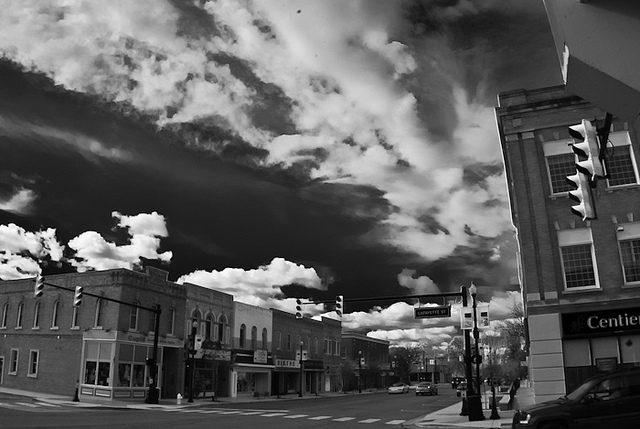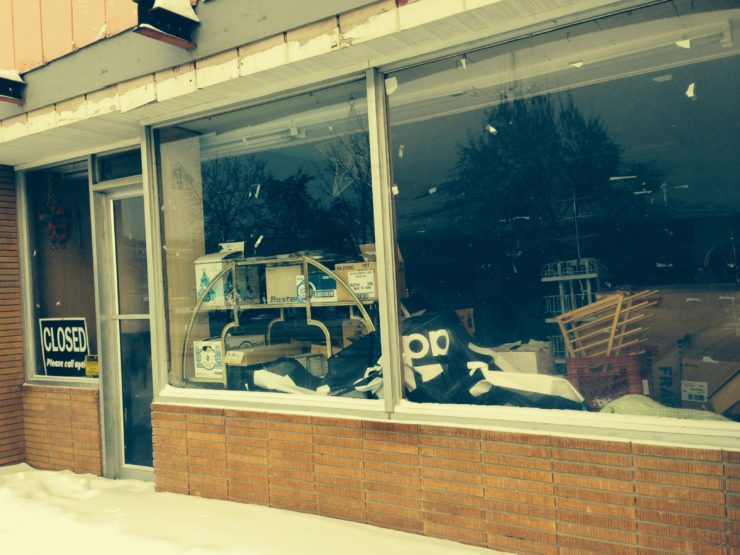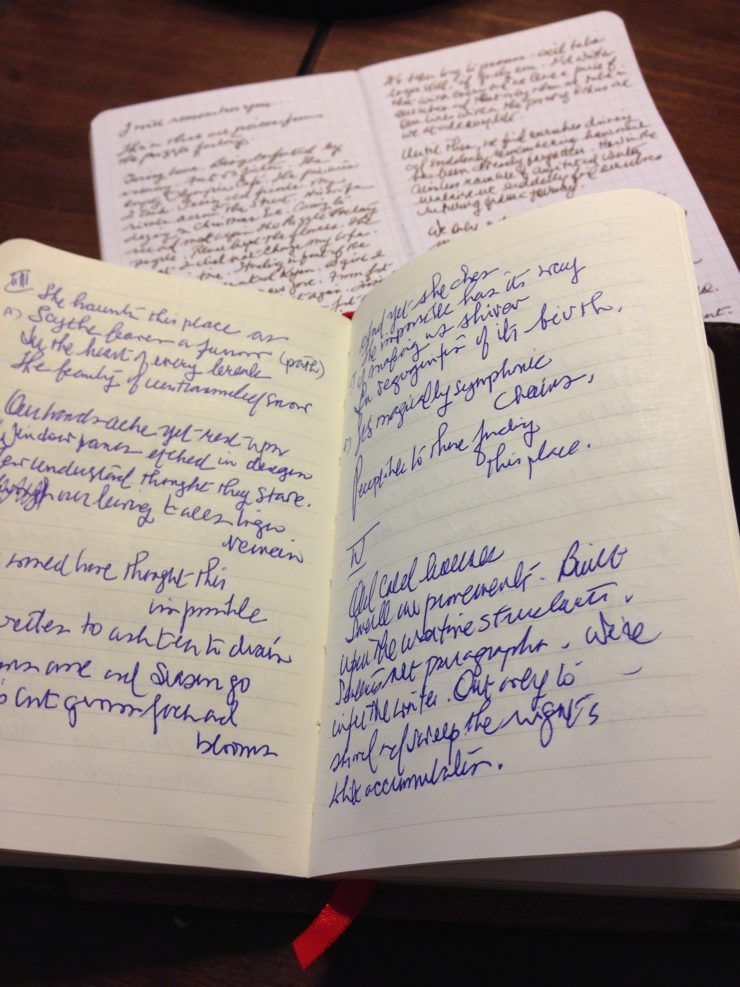Memoir Notebook is a monthly (sometimes more) column dedicated to longer works.
By way of our Memoir Notebook, we want you to meander, get caught up, find yourself taken to places you hadn’t intended to go (but are so glad, in the end, that you went). You’ll get thoughts on aesthetics, craft, latest issues, tips and books to read. But it will feel like poetic narrative. And sometimes it will simply be poetic narrative. Today, Wm. Anthony Connolly talks about ghosts and Olympia Café.
__________________
I will remember you…
It had been almost two weeks since returning from a late December trip that I finally realized I was back. My body arrived—sick with food poisoning no less—much sooner than my mind. The suitcase was long ago emptied and returned to the garage while apparently I continued to unpack moments and experiences. I hear a song while driving and that’s enough.
I compose a moment: In the dimly-lit basement hallway of my sister’s home, weak with nausea, I stand in a fissure of nightlight briefly listening to the furnace spark and rage against winter; and, I glanced back at my messy benighted and borrowed bed and turned, hugging myself through a shiver, to scan ahead the dark stairs.
The ghost has been to visit me, again. Which way did it go?
And I compose another: It was mid-morning and nearly bitterly cold, but not so unpleasant to keep me indoors. Plus I needed to get out. The introvert in me (pardon the pun) gets claustrophobic from time to time, especially with family no matter how much they are loved. The ten-minute walk took me from my sister’s house, on the eastern outskirts of this small prairie city to the core of downtown. Like I said it wasn’t too cold so I smoked my pipe and ambled along through the frost of memories arising from the sight of various landmarks on my route. One such landmark was a shuttered business—The Olympia Café. It struck me so that I stopped walking, reached into my winter coat and retrieved my iPhone to take a picture.
Here it is:
None of this is in any kind of order. The past keeps invading the present and the writer in me keeps an eye upon the future. Which way did it go? Narrative is always being composed in my head as matters unfold. I took notes—as I do with any trip—as best I could, but their significance and bright orders are still being sorted out since they were not dictated in lockstep with my experiences. I take quite some time to process and arrange, but such are the hazards of the memoirist to write things down only to understand the ciphers much, much later. Sifting through my notes after a trip back home is much like fanning out an array of puzzle pieces and slowly working the odd bits into something recognizable.
My small, leather-enclosed, journal has pages and pages of purple-ink code. I write these notes in bed before going to sleep at night as a way of meting out the day. I tend to write and ask questions later. Nothing is too obtuse or bizarre. In these furrowed pages, I have lines about airplanes and delays; about winter and going home; about the delicacy of family. When I returned to the States, while driving I heard a song that triggered something inside me. I stopped at the nearest Starbucks and wrote in yet another journal some kind of narrative.
But I was still puzzled.
The Olympia Café has a huge influence on my life. As a young writer, working at the newspaper across the street, I would often go to the café for lunch, which usually consisted of French fries and a grilled cheese sandwich at the counter. And I frequently found myself talking with Connie, one of the two Greek-born brothers who jointly owned The Olympia. I included the café and Connie in one of my first short stories “Kym’s Moment, ” which I later revised and used in my debut novel The Jenny Muck, serving as the novel’s central locale. The Olympia is always open in my work, never closed or shuttered and it remains so in my upcoming novel The Smallest Universe. And now, here, it was utterly closed.
In late December being in my sister’s home where my father lives now, means seeing a house filled with Christmas. It was my mom’s season. No one loved Christmas more. Gone now almost five years, Christmas’ glitz is joyous but tinged with sadness. Mum died two months after Christmas 2008. She died while I was sleeping. It was two in the morning when my father called to say, “She’s gone.” She died at the Portage General Hospital in our hometown, at the age of 77. It was a long way from where she grew up, and it was a long way from where I awoke, rolled over and picked up the receiver. The immediate cause was lung cancer, but also emphysema.
Her last words to me over the phone weeks before her passing in 2009 were “I love you too son.” I was weeping then, heaving, alone in my office. Dumb. “I always loved you, ” I had said inexplicably, like it had been in doubt. It had been for me only a few weeks since I had surgery on my spine to correct some degenerated discs. I was still recovering and could not fly home to be with her before she died. Our phone call was mostly one-sided—me talking, Mum groaning. Through her moaning, she was able to say goodbye to me. I told her about my favorite memory as she listened. One winter night we sat in one of those café booths watching a parade of people go by, fat snowflakes in the dark nightscape, she had leaned forward and told me something important, but it was a mystery because although I would never forget the moment, I could not remember the words she said.
I don’t remember the moment of her death. It was a telephone, after all. I simply placed it back in its cradle and rolled back over onto the bed. Dyan, my wife, undoubtedly held me. The dogs probably licked at my face. I can only guess. I don’t even remember if I fell back asleep. I might have.
The café booth of my memory with Mum was not in The Olympia Café —this a memoirist must admit. That particular booth was in a hotel lobby further downtown, which had long ago been razed by fire and time. The task for the memoirist is simply to say it as best they can, from what they’ve got: A shiver in the night; the dusty windows of a closed café and some bright orders in the mix of purple ink all pieces of a puzzle.
I wonder about the strength of my heart. It’s taken long to process this—will take longer still, if, finally, ever. I’d written in an unpublished memoir that with every one we meet we leave a piece of ourselves with them, and that only when we take in our lives within the circle and power of others are we complete. Which way did it go? Until then, we find ourselves driving and suddenly remembering how much has been already forgotten. How in the aimless ramble of agitated winter malaise we suddenly find ourselves returning from a journey.
… will you remember me?
—Sarah McLaughlin
Photo by Steve A. Johnson. Creative Commons license via Flickr. Post by Wm. Anthony Connolly.
- Memoir Notebook: Voices (or, How to Write Spiritual Memoir) - October 10, 2014
- Memoir Notebook: Advice for New Memoir Writers - August 1, 2014
- Memoir Notebook: Double I/Eye - July 4, 2014



Maureen Doallas says
So beautifully written, Anthony. So deeply moving.
Anthony says
Thanks Maureen, it’s always appreciated to hear the work has some kind of impact.
Donna says
Wow. First, I want to tell you how much I appreciated the way you shared so beautifully about your mom’s passing, about how you didn’t remember more than you seemed to remember and you describe that… what probably happened. I’m sending you a hug through the atmosphere – two hugs – one for your loss and one for your sharing. I’m sure you weren’t but this felt as if you were speaking directly to me, Anthony. 🙂 But then again, I suppose those of us who do this, at various stages and competencies (mine being the greenest stage) are similar in this respect, yes? Trying to understand how to convey what we know but can’t remember… Reading this piece was the first time I have ever felt like a real memoirist…
And the words you chose: Melting out the day…. oh that’s beautiful!
Anthony says
Donna, your kind words mean the world to me. I try to write this column as a memoir(s) and at the same time to talk a little bit about what it means to write memoir and I’m thankful you picked up on that. You’re one in a million. A sweetie.
Debera Harrington says
Memoirs, yes they are usually a bit jumbled up, with all sorts of information to be looked at later. I enjoyed the read about the Olympia café and about your mother’s passing. Very moving.
Anthony says
Debera, thank you so much for taking the time to read and comment. Part of my job writing this column is to embed instructions and advice as to how one goes about writing memoir(s). For me, its taking the pieces and making a whole; I tried hard to leave this column unprocessed, to a degree, to show how much work a memoirist needs to be with the raw and undigested. Thanks again for reading and commenting.
Karen says
I enjoyed this Anthony.In our minds everything is open.Do you know how hard it is to walk by it and see it this way years later?Sometimes, I avoid walking past it, or I pretend it’s not the same place.I lack the words.Now I must read your stories,to paint me a picture of my childhood and to keep the Olympia always open.Well done.Also I would like to ask how many notebooks have you acquired over the years?I know in my fits and bursts there are many.
Anthony says
I love that “in our minds everything is open,” and I might add, “alive.”
I have seriously kept notebooks/journals since around 1987, and go through about five a year — and I’ve kept most of them so expect to see me on an episode of Hoarders!
Anthony says
I love that “in our minds everything is open,” and I might add, “alive.”
I have seriously kept notebooks/journals since around 1987, and go through about five a year — and I’ve kept most of them so expect to see me on an episode of Hoarders!
Rachel Rinehart says
Beautiful piece, Anthony. I love the rambling of the narrative and how it resembles the journey along a windy road and the moment of discovery as memory is unlocked. You also have lovely images throughout.
Anthony says
You’ve made my night.
The best memoirs/nonfiction to my mind are discursive and fragmentary much as the lives lived by those who write them.
Heather Eure says
This is so good. “The task for the memoirist is simply to say it as best they can, from what they’ve got…” Heart rending. This brought tears to my eyes.
Anthony says
Heather, so kind of you to take the time to read and comment on this. You make me feel as if I have said it as best I could. Thanks.
Sandra Heska King says
See? Donna saw it, too. You wrote “meting out the day,” and I read it as “melting out the day,” and I thought what a beautiful image. And then I realized I read it wrong–unless that’s what you really meant. 🙂
This is a marvelous meandering, Anthony, and this, “The task for the memoirist is simply to say it as best they can, from what they’ve got…,” as Heather said, really touched something deep in me. Thank you for this.
Anthony says
Well thank you Sandra.
To be honest I can’t say unequivocally I didn’t mean “melting.” But yeah, I put “meting” to indicate some measure of judgment. Either works.
Donna says
🙂 I could have sworn it said melting! 🙂 Now I see meting, and understand why you chose that word Anthony. Sandra, maybe we are just itching for the Spring Thaw?? 🙂